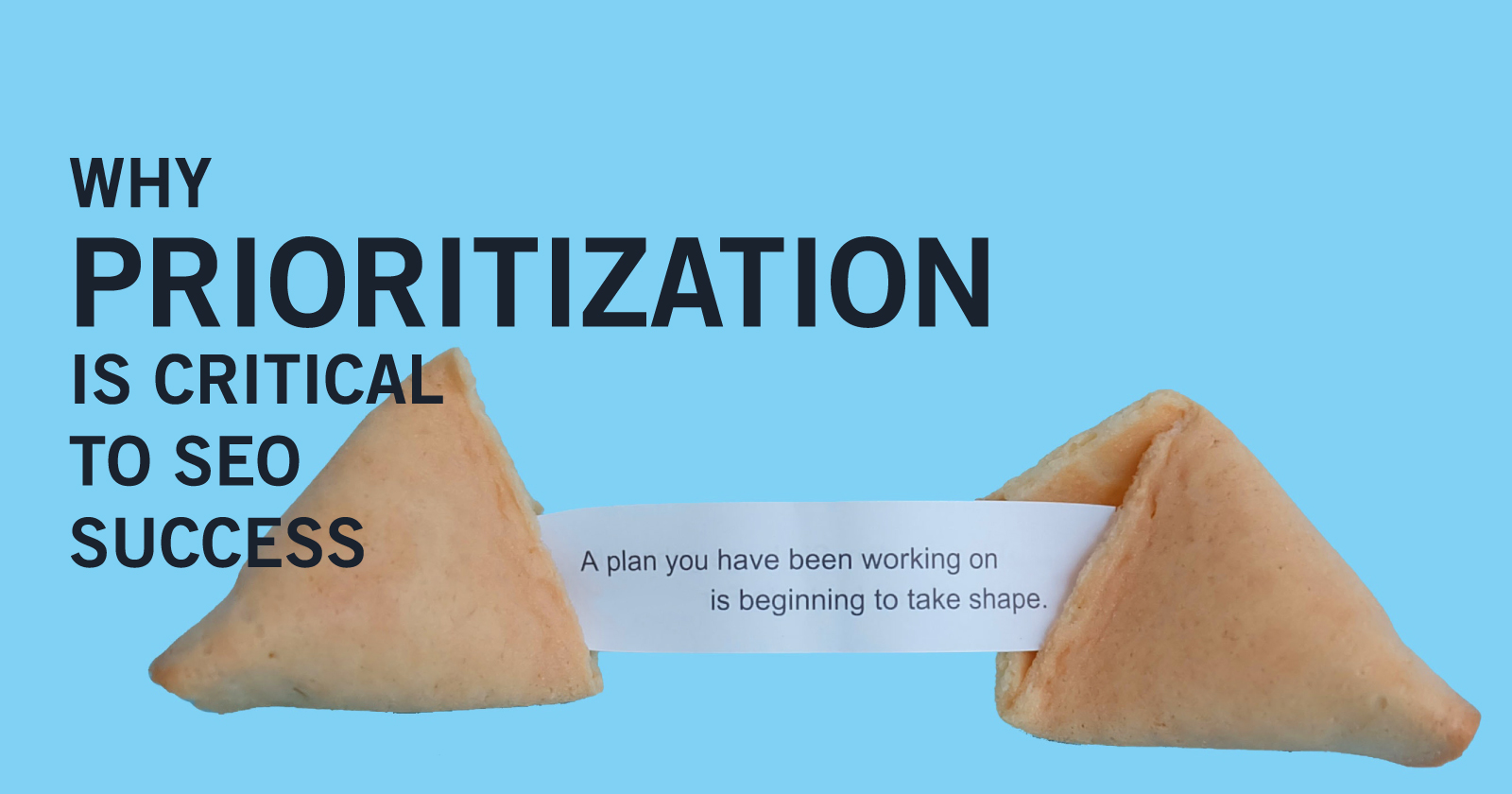SEO is a long-term strategy, where it can take six to 12 months to start seeing meaningful results.
Algorithmic updates from search engines and innovations in technology are constantly reshaping the search landscape.
That’s why SEO professionals must balance ongoing learning and testing with practical implementation to be efficient and effective.
Therefore, prioritization is critical.
Without proper prioritization, you’ll never get the buy-in needed to maintain an effective SEO campaign.
Why Prioritization Matters
SEO is a new(er) marketing practice, which creates unique challenges and added scrutiny.
Limited Budget & Resources
Often, the only resource you have as an in-house SEO is yourself.
You may not have a full team to rely on, so prioritizing when and how work will be done becomes paramount.
Collaboration Is a Must
You typically need to collaborate with another department to fully realize your SEO plans.
Prioritizing work with the most responsive departments (or those you have the best relationships with) will help you get the ball rolling, and allow your campaign to build momentum as you tackle more difficult collaborations later on.
Proving Efficacy & Demonstrating ROI
Obtaining buy-in — and budget — is difficult to begin with.
Unless you show results quickly it can be even more challenging to keep that budget.
Prioritizing SEO projects that require the least amount of resources and provide the most impact is critical during the early stages of a campaign.
SEO is a long-term strategy that takes time and sustained effort to fully realize the benefits of the work.
However, prioritizing the path of least resistance will help you demonstrate early returns, empowering you to achieve your larger goals over the course of a campaign.
There are three areas where prioritization is key:
- On-site and technical optimization.
- Content creation and repurposing.
- Link building.
Prioritizing appropriately within these three areas will set your SEO campaign up for success.
Prioritizing On-Site & Technical Optimization
It’s no accident that prioritizing on-site SEO is the first item we’re covering.
On-page optimizations can have an immediate impact on your website and business.
These tweaks, which are sometimes super simple, can drastically improve the way search engines understand your site, resulting in large gains in the search results, rather quickly.
Not all technical fixes will have the same impact, however.
You need to prioritize.
The bigger and more widespread the issue, the bigger the impact will be when you fix it.
Although every site is different and has different issues, you can generally prioritize technical fixes in the following order:
- Crawlability: Can search engines find your site and pages (e.g., issues with robots.txt, XML sitemap, noindex tags, redirect chains, broken links)?
- Low-value URLs: Do search engines like the pages they find (e.g., issues with duplicate content, soft 404s, hacked pages, faceted navigation)?
- User experience: Can users find your pages, and do they like them (e.g., internal links, image alt text, page speed, content quality)?
This is a general order for prioritization to offer guidance as you audit your site.
But you still need to assess issues on a case-by-case basis.
Again, the potential benefit from a fix depends on the severity of the issue, more so than the type of issue.
Duplicate content issues are less of a priority if you’re talking about a handful of pages, but when that issue spreads across hundreds of pages it becomes much higher priority.
While you need to prioritize specific on-site optimizations over other optimizations, on-page SEO overall should be your priority when launching a campaign.
Prioritizing Content Creation & Repurposing
Content plays an integral role in earning organic search visibility.
Google has repeatedly emphasized the importance of content.
However, the type of content that earns visibility and links takes significant investment.
Prioritization is critical to getting the most of your investment.
You want to focus on creating content that will have the largest impact on your search visibility, and that means finding content gaps and opportunities.
The best approach for finding content opportunities is through keyword research.
A common process for effective keyword research includes:
- Building a list of seed keywords.
- Expanding your keyword list to include body and long-tail keywords.
- Analyzing keywords based on intent, search volume, competition, etc.
- Grouping and prioritizing keywords based on opportunity.
Once you have a handful of high-opportunity keywords, you can begin crafting content around those themes to target the search results associated with them.
Content that directly answers the intent behind these queries will have a strong chance of ranking quickly, particularly if the other results aren’t a great match.
Another option for content optimization is to repurpose old content.
Repurposing existing content often requires less investment than crafting content from scratch and prioritizing these opportunities first can offer quicker SEO results.
But how do you identify content that is worth repurposing?
Having done your keyword research, the first place you should look to target high-opportunity terms is on your site.
Do you already have pages that would match the intent of these terms with some minor tweaking?
If yes, focus on repurposing and optimizing these pages rather than creating new content.
Existing content has the advantage of, well, existing already.
These pages already have links pointing to them, have been indexed, and have some online authority.
Other candidates worthy of repurposing include:
- Content that is both timeless and high-quality.
- Pages that earned significant social attention but lacks links and search visibility.
- Popular pages that could be expanded to cover more or go deeper on a topic.
For more on repurposing content, I suggest reading Buffer’s comprehensive guide.
Content creation can be a significant investment in terms of time and resources, so make sure you’re prioritizing the best opportunities first.
Prioritizing Link Building Opportunities
Link building typically comes last in an SEO campaign, but it’s still important to prioritize link opportunities.
If you have any experience with link building, you know it is the most time-consuming practice in SEO.
Effective link acquisition requires manual prospecting and outreach.
Tools can expedite these processes slightly, but you’re still manually contacting another person and trying to convince them to link.
Due to the difficulty and resource-intensive nature of link building, it’s important to prioritize “low hanging fruit” at the onset of a campaign to build early momentum for the project.
Some examples of link opportunities to prioritize first include:
- Ensuring your brand is listed in the proper free citations (Wikipedia, Google Maps/My Business, Bing Places for Business, etc.)
- Finding niche specific directories.
- Contacting websites you have real-world relationships with.
- Reaching out to websites that are already mentioning and discussing your brand (i.e. unlinked mentions).
- Finding similar pages that are 404s and reaching out to sites linking to them.
These are examples of the types of link opportunities that can provide quicker results and should be prioritized at the beginning of a campaign.
Recap
These are the areas where prioritization is most important:
- On-site and technical optimization: Crawlability, low-value URLs, and user experience.
- Content creation and repurposing: Leverage keyword research to identify the best opportunities and repurpose evergreen content for extra search value.
- Link building: Prioritize “low-hanging fruit,” such as unlinked mentions and partner companies.
The ability to prioritize is often an overlooked skill in SEO, but prioritization is the secret to achieving quick results and gaining the trust and budget necessary for long-term success.
More Resources:
- SEO 101: Learn the Basics of Search Engine Optimization
- A Complete Guide to SEO: What You Need to Know in 2019
- 10 Important 2019 SEO Trends You Need to Know
Image Credits
Featured Image: Created by author, December 2018





